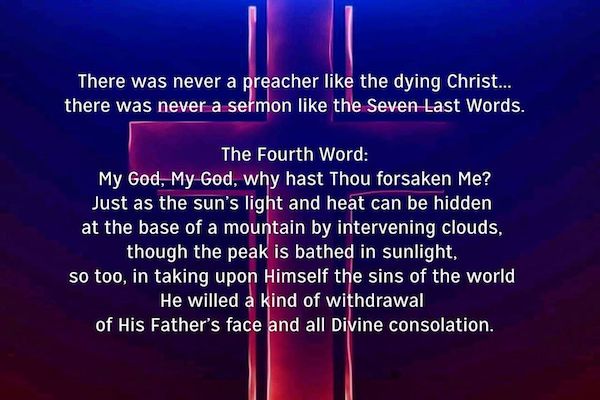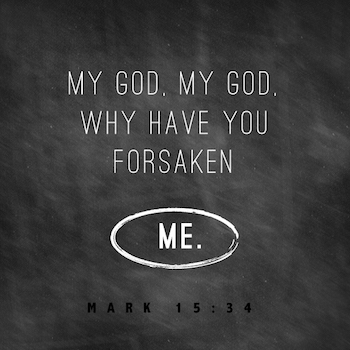LENT 2024: Day 35 - LIFE OF CHRIST

LENT 2024: DAY 35 - Monday March 25
“Our Lord spoke seven times from the Cross; these are called His Seven Last Words. In the Scriptures the dying words of only three others were recorded: Israel, Moses, and Stephen. The reason perhaps is that no others are found so significant and representative as these three. Israel was the first of the Israelites; Moses, the first of the legal dispensation; Stephen, the first Christian martyr. The dying words of each began something sublime in the history of God’s dealings with men.
In His goodness, Our Blessed Lord left His thoughts on dying, for He – more than Israel, more than Moses, more than Stephen – was representative of all humanity. In this sublime hour He called all His children to the pulpit of the Cross, and every word He said to them was set down for the purpose of an eternal publication and an undying consolation. There was never a preacher like the dying Christ; there was never a congregation like that which gathered about the pulpit of the Cross; there was never a sermon like the Seven Last Words.
The Fourth Word:
From twelve o’clock until three o’clock there was an unearthly darkness that fell over the land, for nature, in sympathy with its Creator, refused to shed its light upon the crime of deicide. Mankind, having condemned the Light of the World, now lost the cosmic symbol of that Light, the sun. At Bethlehem, where He was born at midnight, the heavens were suddenly filled with light; at Calvary, when He entered into the ignominy of His Crucifixion at midday, the heavens were bereaved of light. Centuries before, the prophet Amos had said: “Day of doom, says the Lord god, when there shall be sunset at noon, and earth shall be overshadowed under the full light!” (Amos 8:9)
An unearthly stillness, which was rather normal in darkness, now became frightening in the abnormal darkness of high noon… This darkness not only signified that men were putting out the Light Who illumined every man coming into this world, but also that he was denying Himself, for the moment, the light and consolation of His Divinity. Suffering now passed from the body into the mind and soul, as He spoke with a loud voice:
“My God, My God, why hast Thou forsaken Me?”
(Matthew 27:46)

During this part of the Crucifixion, Our Blessed Lord was repeating the Psalm of David which prophetically referred to Him, though written a thousand years before. “My God, My God, why hast thou forsaken Me…?” (Psalm 22:1) The signal feature in the sufferings of Our Lord revealed in this Psalm was His desolation and solitude. The Divine Son called His Father “My God” – in contrast to the prayer which taught men to say “Our Father Who art in heaven”… Just as the sun’s light and heat can be hidden at the base of a mountain by intervening clouds, though the peak is bathed in sunlight, so too, in takin g upon Himself the sins of the world he willed a kind of withdrawal of His Father’s face and all Divine consolation. Sin has physical effect, and these He bore by having His hands and feet pierced; sin has mental effects which He poured forth in the Garden of Gethsemane; sin also has spiritual effects such as a sense of abandonment, separation from God, loneliness. This particular moment He willed to take upon Himself that principal effect of sin which was abandonment.
Man rejected God; so now He willed to feel that rejection. Man turned away from god; now He, Who was God united personally with a human nature, willed to feel in that human nature that awful wrench as if He Himself were guilty. Earth had already abandoned Him by lifting His cross above it; heaven had already abandoned Him by veiling itself in darkness; and yet suspended between both, He united both. In that cry were all the sentiments in human hearts expressive of a Divine nostalgia… As He entered upon the extreme penalty of sin, which is separation from God, it was fitting that His eyes be filled with darkness and His soul with loneliness.
The Old Testament had prophesied that He Who hangs upon a tree is curse; the darkness gave expression to that burning curse which He would remove by bearing it and triumphing in the Resurrection… In this particular midday, He stood between the light which was created and the ultimate darkness where evil will be condemned. The tensions of history He felt within Himself: The Light came into the darkness but the darkness did not comprehend the Light. As a dying person sometimes sees his whole life summarized, so now He saw all history recapitulated in Himself when the darkness of sin had its moment of triumph.
Christ’s cry was of abandonment which He felt standing in a sinner’s place, but it was not of despair… This emptiness of humanity through sin, though he felt it as His own, was nevertheless spoken with a loud voice to indicate not despair, but rather hope that the sun would rise again and scatter the darkness.”
(Chapter 49, pgs. 800 – 806)
+ QUOTES FOR LIFE